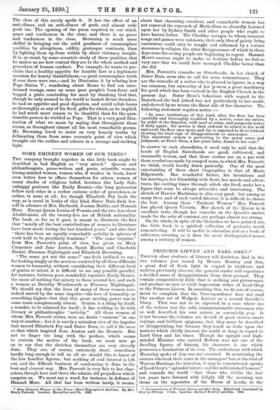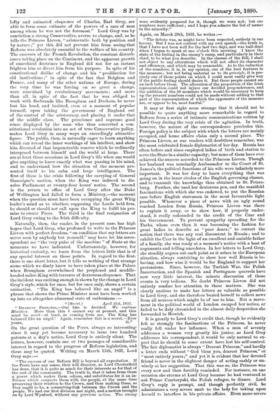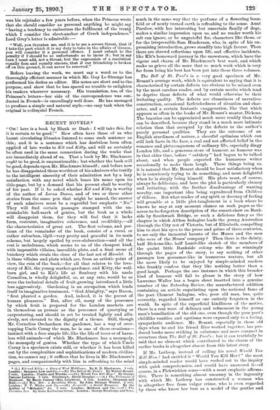PRINCESS LIEVEN AND EARL GREY.*
THOUGH close students of history will doubtless find in the two volumes just issued by Messrs. Bentley and Son, a great deal of fresh light in regard to incidents and motives previously obscure, the general reader will experience a decided sense of disappointment from their perusal. They contain comparatively little that is striking and picturesque, and produce no new or vivid impression either of Lord Grey or the Princess Lieven. In asserting this, we do not, of coarse, mean to complain that the Correspondence does not read like another set of Walpole Letters or a second Greville's Diary. That was not to be expected in a case where one of the writers was the cold, unimpressionable statesman who so well described his own nature as essentially grey. It is not because the volumes are devoid of good stories, smart sayings, and brilliant epigrams, that they must be described as disappointing, but because they touch so little upon the matters which chiefly interest the world at large in regard to Lord Grey and his times. Though the upright and high- minded Minister who carried Reform was not one of the dazzling figures of history, his character is one which possesses a fascination of its own. The enthusiasm with which Macaulay spoke of him was not assumed. In mentioning the orators who took their seats in the managers' box at the trial of Warren Hastings, the historian, it may be remembered, speaks of Lord Grey's " splendid talents and his unblemished honour," and reminds the world "that those who within the last ten years have listened with delight till the morning sun shone on the tapestries of the House of Lords, to the • Correspondence of Princess Lieven and Earl Grey. Edited and translated by Gay Le Strange. 2 vols. London: Richard Bentley and Son. 1890.
lofty and animated eloquence of Charles, Earl Grey, are able to form some estimate of the powers of a race of men among whom he was not the foremost." Lord Grey was by conviction a strong Conservative, averse to change, and, as he tells the Princess Lieven, "aristocratic both by position and by nature ;" yet this did not prevent him from seeing that Reform was absolutely essential to the welfare of his country.
The excesses of the French Revolution, the constant disturb- ances taking place on the Continent, and the apparent growth of anarchical doctrines in England did not for an instant frighten him or divert him from his purpose. In spite of his constitutional dislike of change and his "predilection for old institutions ;" in spite of the fact that Belgium and France, and many of the other nations of Europe, during the very time he was forcing on so great a change, were convulsed by revolutionary movements ; and more than all, in spite of the fact that he was obliged to work with firebrands like Brougham and Durham, he never lost his head, and insisted, even at a moment of popular turmoil, upon taking the government of England out of the control of the aristocracy, and placing it under that of the middle class. The prescience and supreme good sense displayed by the man who thus converted a con- stitutional revolution into an act of true Conservative policy, makes Lord Grey in many ways an exceedingly attractive figure. The public, then, is naturally eager to learn anything which can reveal the inner workings of his intellect, and show him divested of that impenetrable reserve which he ordinarily interposed between himself and the world at large. There are at least three occasions in Lord Grey's life when one would give anything to know exactly what was passing in his mind, and to understand how the situation of the moment pre- sented itself to his calm and large intelligence. The
first of these is the crisis following the carrying of General Ga,scoigne's motion, when the King was induced to. dis- solve Parliament at twenty-four hours' notice. The second
is the return to office of Lord Grey after the Duke of Wellington had failed to form a Ministry,—the moment when the question must have been occupying the great Whig leader's mind as to whether, supposing the Lords held firm, he should or should not call upon the King to fulfil his pro- mise to create Peers. The third is the final resignation of Lord Grey owing to the Irish difficulty.
Naturally, then, the reader, in the present case, has high hopes that Lord Grey, who professed to write to the Princess Lieven with perfect freedom, "on condition that my letters are never seen by anybody but yourself," may have let his corre- spondent see "the very pulse of the machine" of State at the moments we have indicated. Unfortunately, however, for historical curiosity, we learn from the letters little that is of any special interest on these points. In regard to the first, there is one short letter, but it tells us nothing of that strange scene which we dimly know to have taken place at the Palace when Brougham overwhelmed the perplexed and muddle- headed sailor-King with torrents of dexterous eloquence. That the incident was exciting enough is shown by the change in Lord Grey's style, which for once, but for once only, shows a certain animation. "The King has behaved like an angel" is a phrase that shows the Prime Minister must have been worked up into an altogether abnormal state of enthusiasm :—
" (Secret.) April 21st, 1831.
"DEAREST Parivcsss,—Our fate is decided. We continue Ministers More than this I cannot say at present, and this must be secret—at least, as coming from me. The King has behaved like an angel ! Again, remember this is a secret.—Ever yours, On the great question of the Peers, always so interesting, since it may yet become necessary to issue two hundred patents at a day's notice, Lord Grey is entirely silent. The letters, however, contain one or two passages of considerable interest in regard to the progress of Reform legislation, and these may be quoted. Writing on March L5th, 1831, Lord Grey says The success of our Reform Bill is beyond all expectation. If the Peers have any sense, they wfll discover, as Lord Chesterfield has done, that it is quite as much for their interests as for that of the rest of the community. The truth is, that it takes from them a power which makes them odious, and substitutes for it an in- fluence which connects them with the people, at the same time preserving their relation to the Crown, and thus making them, as they ought to be, a connecting-link between the Crown and the people. We had our first division last night, and a motion brought on by Lord Wynford, without any previous notice. The enemy
were evidently prepared for it, though we were not; but our numbers were sufficient ; and I hope you admire the list of names in the minority."
Again, on March 29th, 1831, he writes :— "The debate was, as might have been expected, entirely in our favour. But I was not content with my own speech—the truth is, that I have not been well for the last two days, and was half-dead when I began to speak at one o'clock this morning. I know the state of the feeling in the enemy's camp, and particularly in their chief, to be what you describe. In the clauses of the Bill, I shall not object to any alterations which will not affect AS character and efficiency, and which may be reasonable. As to the reduction of the numbers, it is, in my opinion, one of the best features in the measure ; but not being material as to its principle, it is pre- cisely one of those points on which I could most easily give way if the public feeling should desire it. But these people cannot see an inch before them. The alteration of the proportion of the Irish representation could not injure our decided preponderance, and the addition of the 58 members which would be necessary to keep up the present numbers could not be made without adding to that part of the representation of which the opponents of the measure are, or appear to be, most fearfuL"
It may at first sight seem strange that it should not be possible to quote anything more remarkable in regard to Reform from a series of intimate communications written by
Lord Grey during the very crisis of the agitation. In truth, however, the nature of the correspondence precludes this. Foreign policy is the subject with which the letters are mainly occupied, and home affairs claim only a second place. The Princess Lieven, as our readers will doubtless remember, was the most celebrated female diplomatist of her day. Russia has often before and since employed ladies of birth and station to serve the State in a similar capacity; but none of them have ever achieved the success accorded to the Princess Lieven. Though her husband was nominally Ambassador to the Court of St.
James's, the political functions of his wife were infinitely more important. It was her duty to learn everything that was going on in the inner circles of the English governing classes, and to transmit the knowledge thus obtained to St. Peters- burg. Further, she used her dexterous pen, and the manifold fascinations with which she was endowed, to put the Russian case before English statesmen in the most favourable light possible. Whenever a piece of news with an ugly sound reached London from Russia, Princess Lieven was there to explain it away, or to show how, if properly under- stood, it really redounded to the credit of the Czar and his Government. To prevent sympathy spreading for the Turks, whom even then it was becoming the fashion for great ladies to describe as "poor dears ;" to correct the notion that there was any real discontent in Russia ; and to exhibit the Czar in the light of an excellent and amiable father of a family, she was ready at a moment's notice with a host of arguments and telling anecdotes. In her letters to Lord Grey, she steadily argues out each point as it arises in the European situation, always contriving to show how well Russia is be- having, and how wise it would be for England to support her pretensions. Since, however, the Turkish War, the Polish Insurrection, and the Spanish and Portuguese quarrels have now very little interest, the minute discussion of these events is very tedious. No doubt Princess Lieven did not entirely confine her attention to these matters. She was clearly anxious to make her letters as valuable as possible to Lord Grey, and she therefore busied herself to collect news
from all sources which might be of use to him. Not a move- ment in the political world of London escaped her notice, or
failed to be duly chronicled in the almost daily despatches she forwarded to Howick.
It is greatly to Lord Grey's credit that, though he evidently felt so strongly the fascinations of the Princess, he never really fell under her influence. When a man of seventy addresses a woman very greatly his junior, as Lord Grey addresses his correspondent, it would be only natural to ex-
pect that he should to some extent have lost his self-control. The fair diplomatist is always "Dearest Princess," and hardly a letter ends .without "God bless you, dearest Princess," or "most entirely yours ;" and yet it is evident that her devoted friend is never in the slightest danger of acting rashly or un- wisely at her suggestion. That this was so, the Princess was every now and then forcibly reminded. For instance, on one occasion she storms at Lord Grey because he had ventured to ask Prince Czartoryski, the Polish refugee, to dinner. Lord Grey's reply is .prompt, and though perfectly civil, ix
administers a very severe snub to the lady for taking upon -herself to interfere in his private affairs. Sven more-severe was his rejoinder a few years before, when the Princess wrote that she should consider as personal anything he might say "having a tendency to embarrass the fulfilment of the treaty which I consider the sheet-anchor of Greek independence." Lord Grey's letter is admirable :—
" Well, you threaten me, and it is to me a severe threat, that if I take the part which it is my duty to take in the affairs of Greece, you will consider it a personal offence. I must submit to the penalty if Ishouldbe so unfortunate as to incur it ; but in my turn I must add; not a threat, but the expression of a resolution
e y firm ad n equally sincere, that if our friendship is broken off ground, it can never be renewed."
Before leaving the work, we must say a word as to the thoroughly efficient manner in which Mr. Guy Le Strange has performed his duties as editor. His notes are short and to the purpose, and show that he has spared no trouble to enlighten his readers wherever necessary. His translation, too, of the Princess's letters—her side of the correspondence was con- ducted in French—is exceedingly well done. He has managed to produce a. simple and, natural style,—no easy task when the original is colloquial French.




















































 Previous page
Previous page